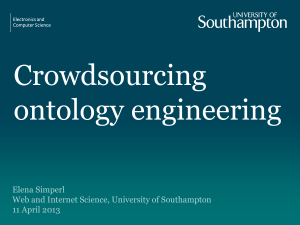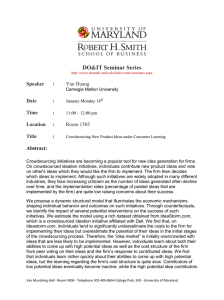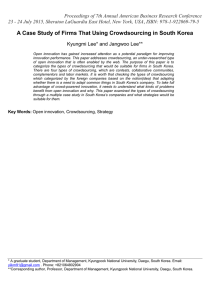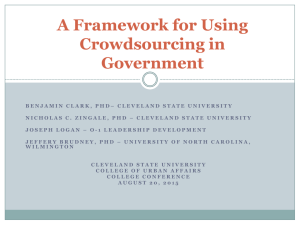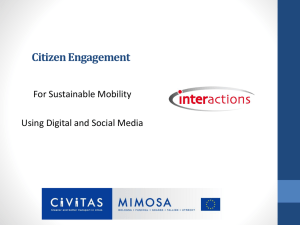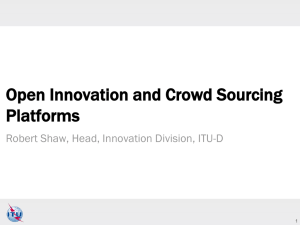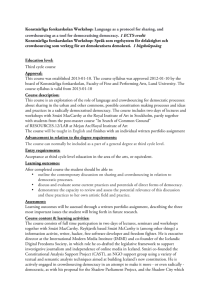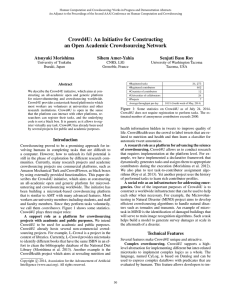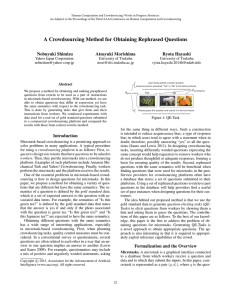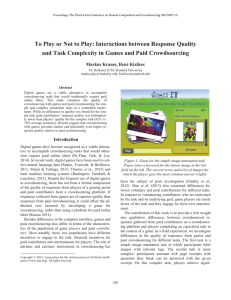Volunteer-Based Crowdsourcing with Crowd4U Atsuyuki Morishima Abstract
advertisement
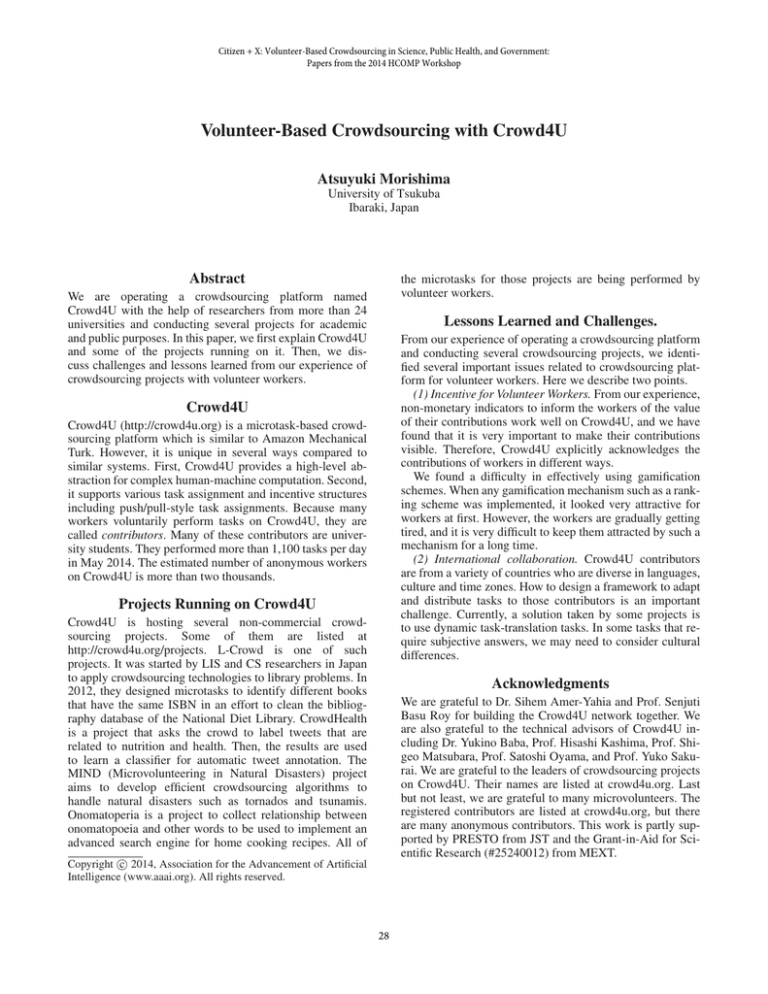
Citizen + X: Volunteer-Based Crowdsourcing in Science, Public Health, and Government: Papers from the 2014 HCOMP Workshop Volunteer-Based Crowdsourcing with Crowd4U Atsuyuki Morishima University of Tsukuba Ibaraki, Japan Abstract the microtasks for those projects are being performed by volunteer workers. We are operating a crowdsourcing platform named Crowd4U with the help of researchers from more than 24 universities and conducting several projects for academic and public purposes. In this paper, we first explain Crowd4U and some of the projects running on it. Then, we discuss challenges and lessons learned from our experience of crowdsourcing projects with volunteer workers. Lessons Learned and Challenges. From our experience of operating a crowdsourcing platform and conducting several crowdsourcing projects, we identified several important issues related to crowdsourcing platform for volunteer workers. Here we describe two points. (1) Incentive for Volunteer Workers. From our experience, non-monetary indicators to inform the workers of the value of their contributions work well on Crowd4U, and we have found that it is very important to make their contributions visible. Therefore, Crowd4U explicitly acknowledges the contributions of workers in different ways. We found a difficulty in effectively using gamification schemes. When any gamification mechanism such as a ranking scheme was implemented, it looked very attractive for workers at first. However, the workers are gradually getting tired, and it is very difficult to keep them attracted by such a mechanism for a long time. (2) International collaboration. Crowd4U contributors are from a variety of countries who are diverse in languages, culture and time zones. How to design a framework to adapt and distribute tasks to those contributors is an important challenge. Currently, a solution taken by some projects is to use dynamic task-translation tasks. In some tasks that require subjective answers, we may need to consider cultural differences. Crowd4U Crowd4U (http://crowd4u.org) is a microtask-based crowdsourcing platform which is similar to Amazon Mechanical Turk. However, it is unique in several ways compared to similar systems. First, Crowd4U provides a high-level abstraction for complex human-machine computation. Second, it supports various task assignment and incentive structures including push/pull-style task assignments. Because many workers voluntarily perform tasks on Crowd4U, they are called contributors. Many of these contributors are university students. They performed more than 1,100 tasks per day in May 2014. The estimated number of anonymous workers on Crowd4U is more than two thousands. Projects Running on Crowd4U Crowd4U is hosting several non-commercial crowdsourcing projects. Some of them are listed at http://crowd4u.org/projects. L-Crowd is one of such projects. It was started by LIS and CS researchers in Japan to apply crowdsourcing technologies to library problems. In 2012, they designed microtasks to identify different books that have the same ISBN in an effort to clean the bibliography database of the National Diet Library. CrowdHealth is a project that asks the crowd to label tweets that are related to nutrition and health. Then, the results are used to learn a classifier for automatic tweet annotation. The MIND (Microvolunteering in Natural Disasters) project aims to develop efficient crowdsourcing algorithms to handle natural disasters such as tornados and tsunamis. Onomatoperia is a project to collect relationship between onomatopoeia and other words to be used to implement an advanced search engine for home cooking recipes. All of Acknowledgments We are grateful to Dr. Sihem Amer-Yahia and Prof. Senjuti Basu Roy for building the Crowd4U network together. We are also grateful to the technical advisors of Crowd4U including Dr. Yukino Baba, Prof. Hisashi Kashima, Prof. Shigeo Matsubara, Prof. Satoshi Oyama, and Prof. Yuko Sakurai. We are grateful to the leaders of crowdsourcing projects on Crowd4U. Their names are listed at crowd4u.org. Last but not least, we are grateful to many microvolunteers. The registered contributors are listed at crowd4u.org, but there are many anonymous contributors. This work is partly supported by PRESTO from JST and the Grant-in-Aid for Scientific Research (#25240012) from MEXT. c 2014, Association for the Advancement of Artificial Copyright Intelligence (www.aaai.org). All rights reserved. 28
